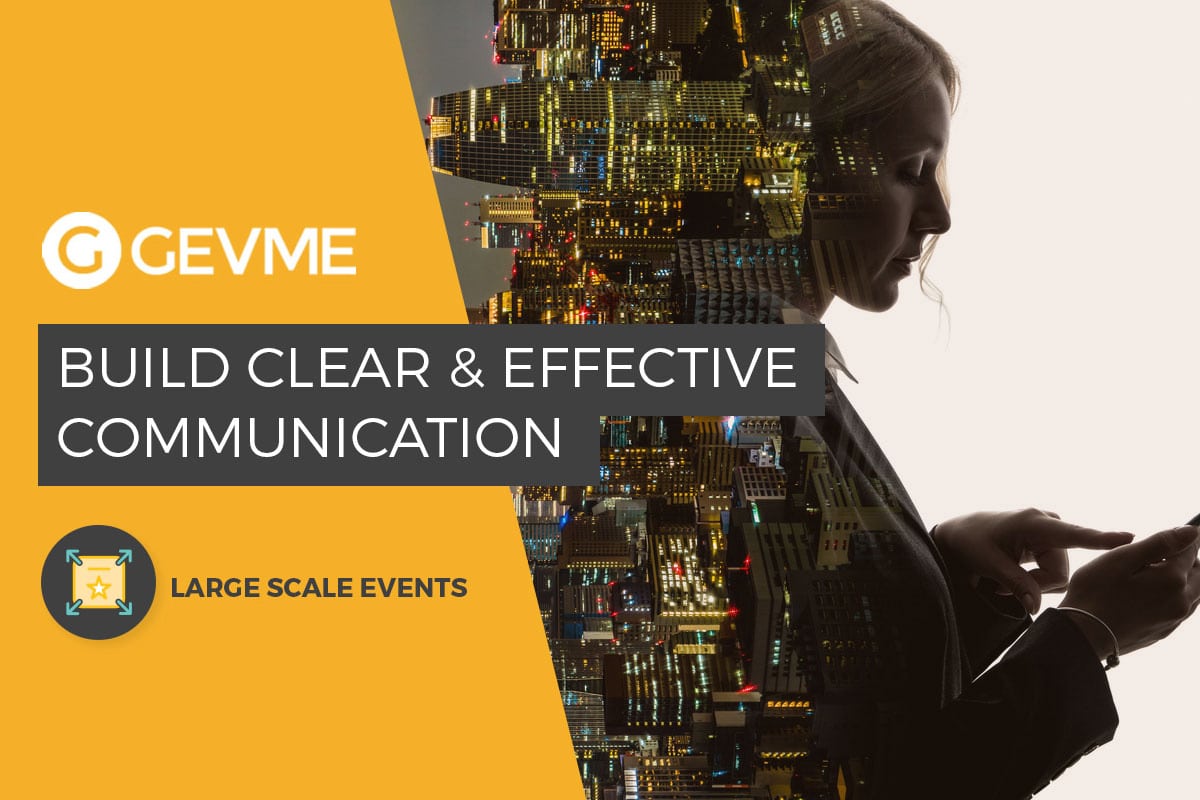If you’ve ever been to conferences like CES, which hosts over 200,000 attendees annually, you must have asked yourself this one question: “How do they manage such a huge crowd?” The answer is that you just need one strong event communications plan that is supported by reliable devices and that can be used on site to deliver messages and give instructions. Sound easy enough? Well, it’s not really a piece of cake. To be able to carry the weight of a large-scale event, one should start developing a detailed plan of interaction weeks or even months before the start of the event.
Communication timeline
Ideally, a large-scale meeting with 5,000+ invitees should be allocated no less than 12 months in terms of planning and organisation. Here’s a short timeline that you can develop based on the indicated time period:
12–11 months: Break the news about the event using different communication channels of your choice.
10–9 months: Gather the team and develop a set of tasks for them and also set up an internal communications mechanism.
8–2 months: Plan and execute pre-event marketing activities (active posting on social media, UGC creation, email invites, etc.). Build a comprehensive event website and communicate the key agenda.
2–1 months: Clarify the key questions with your team, and organise pre-event training with onsite staff to instruct them on how and when to use communication devices during an event.
During event: Share real-time updates, manage communication with guests via mobile apps, carry out marketing activities, and track onsite check-in communication.
After event: Manage thank you emails, wrap ups, follow-up offers, and the collection of feedback.
Communications plan for a large-scale event

Your plan of communications should be agreed upon internally with all members of the team at least two months before an event. Check out the major questions you’ll need to answer in your event communication system:
- Who’s the main point of contact for each aspect of event management (registration, venue navigation, catering, lighting, etc.)?
- How should a message be delivered to a team (first-priority channel/device, backup tools, emergency tools, etc.)?
- How often should team meetings be organised before an event and which aspects have to be discussed at these meetings?
- How will communication with guests be managed?
The key communication skills a successful event planner should possess
Event planning is about building relationships before, during, and after an event. Obviously, solid communication skills are vital when it comes to this profession. Here’s what you should have in your skill set if you want to be a successful event manager:
- Excellent presentation skills: If you’re able to demonstrate your top achievements to a client as well as deliver an event message to a team as clearly as possible, you’re already halfway there.
- The ability to express your thoughts in writing: Yes, you might be able to delegate the task of agenda creation to a colleague or have an experienced writer create catchy event invitations for you. However, communication with vendors, partners, and speakers is most often handled personally by an event planner. If your knowledge of contractual language is quite good and your friends say you can express yourself clearly in emails, communicating through writing may be one of your biggest perks.
- The power of negotiation: Your budget may not always be super generous. Especially when it comes to large-scale events, negotiating deals with suppliers and hotels will save you a great deal on your costs and will help to establish long-term connections.
How to build an event communications plan
Having a communication plan for an event is a primary step to take for successful event organisation. How should you integrate important information rollouts into your marketing campaigns? What strategy should you use to engage your attendees? Here are the key steps to building a good communications plan:
- Lay the groundwork.
Before you can begin building your communications strategy, set priorities and goals and include them in an agenda. Assemble your core communications team, and set a timeline.
- Evaluate resources, and allocate a budget.
Before committing to any activities or initiatives, review existing resources, set a budget, and look for outside resources, if needed.
- Develop a communications and outreach plan.
You should identify the key leaders, such as an individual or agency, to take the lead on developing as well as key supporters and other state or national communications experts. Provide them with opportunities for feedback and vetting. Coordinate internal communications as well.
- Put your plan into action.
Build support and measure success. Follow up after the event.
Important details to communicate

To speed up event organisation management, you should ensure there’s a perfect understanding of some of the major details, on both the side of your team and that of the attendees:
- Event agenda and major activities: The value offer that you provide your audience with is pretty much reflected by the event agenda. Ensure your guests can plan their activities ahead of time by communicating the agenda via a mobile app as well as an event website.
- Communication channels: This aspect concerns not only your team but attendees as well. Construct a system of communication before an event, and instruct people on matters like online registration, onsite check-in, the use of apps, and more while large scale event planning.
- Lists of speakers and hosts: Collect photos, short bios, and interesting details about event speakers, place this information on the event website, and embed speaker lists in the event apps. Inform your team about who the hosts are, and provide them with relevant contact data to ensure they can connect when needed.
- Music: Sound is something that builds the atmosphere at your event. If you plan to have a DJ or invite a band to entertain guests, acquaint attendees with the music agenda in advance.
- Venue navigation: With good tracking tools, you can manage the crowd in real time. It’s still a good strategy, however, to provide your team and attendees with a venue map before an event to prevent severe traffic congestion on site. The organisers at Web Summit, for instance, developed an online navigation feature embedded in an event app to assist attendees with moving around venue spaces.
- Refreshments: Appoint a catering master who’ll be responsible for communication with catering vendors as well as attendees.
- Dress code (if any): At large-scale conferences, people are usually dressed business casual. If it’s important to your client or if some other dress code is preferred, communicate this requirement in advance.
Ways to facilitate communication for large events
If there’s a need to solve an ongoing challenge on the ground and you have to reach your team ASAP, there are some tools that proficient event masters use before and during large-scale event management to stay connected:
Content
The way you convey the information while building an event communication plan also matters. That is why high-quality and up-to-date content that you produce always has a greater chance of reaching the target of your communication than anything else. Blog posts, email notifications, newsletters, and so on are all good tools to stay connected.
CTA
There is no good content without a strong CTA, so make sure you include one in every message addressed to your audience.
Video conferencing tools
Instruments like Skype for Business are great for starting a video conversation with your team, messaging and sharing screens during pre-event meetings.
Mobile event apps
From push notifications to group chats and public bulletin boards, mobile apps support communication in a large group of people, enabling efficient sync ups in real time.
Social media
This is the best choice if you need to not only connect to an internal team but also communicate important updates to the audience. Also, if you want to deepen the quality of attendees’ interactions, utilise social media walls that streamline UGC in real time.
Conclusion
To simplify large-scale events communication, integrated communications plan for event , event professionals have to build a system for automated interaction with both a team and the attendees at every level of event organisation.
Learn how to build event communications plan perfectly with our help!








